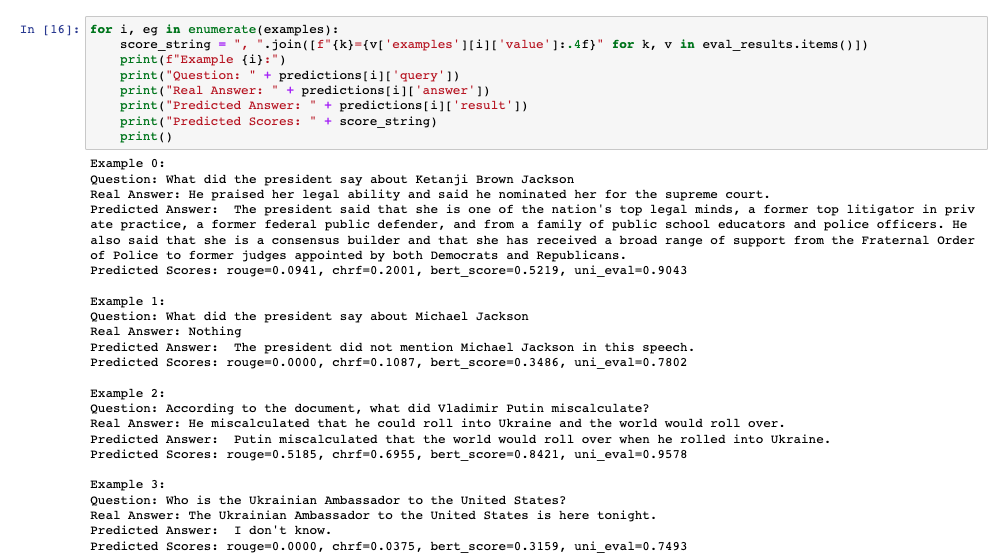This PR adds a LangChain implementation of CAMEL role-playing example:
https://github.com/lightaime/camel.
I am sorry that I am not that familiar with LangChain. So I only
implement it in a naive way. There may be a better way to implement it.
Improvements to Deep Lake Vector Store
- much faster view loading of embeddings after filters with
`fetch_chunks=True`
- 2x faster ingestion
- use np.float32 for embeddings to save 2x storage, LZ4 compression for
text and metadata storage (saves up to 4x storage for text data)
- user defined functions as filters
Docs
- Added retriever full example for analyzing twitter the-algorithm
source code with GPT4
- Added a use case for code analysis (please let us know your thoughts
how we can improve it)
---------
Co-authored-by: Davit Buniatyan <d@activeloop.ai>
Right now, eval chains require an answer for every question. It's
cumbersome to collect this ground truth so getting around this issue
with 2 things:
* Adding a context param in `ContextQAEvalChain` and simply evaluating
if the question is answered accurately from context
* Adding chain of though explanation prompting to improve the accuracy
of this w/o GT.
This also gets to feature parity with openai/evals which has the same
contextual eval w/o GT.
TODO in follow-up:
* Better prompt inheritance. No need for seperate prompt for CoT
reasoning. How can we merge them together
---------
Co-authored-by: Vashisht Madhavan <vashishtmadhavan@Vashs-MacBook-Pro.local>
This pull request adds an enum class for the various types of agents
used in the project, located in the `agent_types.py` file. Currently,
the project is using hardcoded strings for the initialization of these
agents, which can lead to errors and make the code harder to maintain.
With the introduction of the new enums, the code will be more readable
and less error-prone.
The new enum members include:
- ZERO_SHOT_REACT_DESCRIPTION
- REACT_DOCSTORE
- SELF_ASK_WITH_SEARCH
- CONVERSATIONAL_REACT_DESCRIPTION
- CHAT_ZERO_SHOT_REACT_DESCRIPTION
- CHAT_CONVERSATIONAL_REACT_DESCRIPTION
In this PR, I have also replaced the hardcoded strings with the
appropriate enum members throughout the codebase, ensuring a smooth
transition to the new approach.
The GPT Index project is transitioning to the new project name,
LlamaIndex.
I've updated a few files referencing the old project name and repository
URL to the current ones.
From the [LlamaIndex repo](https://github.com/jerryjliu/llama_index):
> NOTE: We are rebranding GPT Index as LlamaIndex! We will carry out
this transition gradually.
>
> 2/25/2023: By default, our docs/notebooks/instructions now reference
"LlamaIndex" instead of "GPT Index".
>
> 2/19/2023: By default, our docs/notebooks/instructions now use the
llama-index package. However the gpt-index package still exists as a
duplicate!
>
> 2/16/2023: We have a duplicate llama-index pip package. Simply replace
all imports of gpt_index with llama_index if you choose to pip install
llama-index.
I'm not associated with LlamaIndex in any way. I just noticed the
discrepancy when studying the lanchain documentation.
This PR adds additional evaluation metrics for data-augmented QA,
resulting in a report like this at the end of the notebook:

The score calculation is based on the
[Critique](https://docs.inspiredco.ai/critique/) toolkit, an API-based
toolkit (like OpenAI) that has minimal dependencies, so it should be
easy for people to run if they choose.
The code could further be simplified by actually adding a chain that
calls Critique directly, but that probably should be saved for another
PR if necessary. Any comments or change requests are welcome!
I originally had only modified the `from_llm` to include the prompt but
I realized that if the prompt keys used on the custom prompt didn't
match the default prompt, it wouldn't work because of how `apply` works.
So I made some changes to the evaluate method to check if the prompt is
the default and if not, it will check if the input keys are the same as
the prompt key and update the inputs appropriately.
Let me know if there is a better way to do this.
Also added the custom prompt to the QA eval notebook.
- Add support for local build and linkchecking of docs
- Add GitHub Action to automatically check links before prior to
publication
- Minor reformat of Contributing readme
- Fix existing broken links
Co-authored-by: Hunter Gerlach <hunter@huntergerlach.com>
Co-authored-by: Hunter Gerlach <HunterGerlach@users.noreply.github.com>
Co-authored-by: Hunter Gerlach <hunter@huntergerlach.com>
Big docs refactor! Motivation is to make it easier for people to find
resources they are looking for. To accomplish this, there are now three
main sections:
- Getting Started: steps for getting started, walking through most core
functionality
- Modules: these are different modules of functionality that langchain
provides. Each part here has a "getting started", "how to", "key
concepts" and "reference" section (except in a few select cases where it
didnt easily fit).
- Use Cases: this is to separate use cases (like summarization, question
answering, evaluation, etc) from the modules, and provide a different
entry point to the code base.
There is also a full reference section, as well as extra resources
(glossary, gallery, etc)
Co-authored-by: Shreya Rajpal <ShreyaR@users.noreply.github.com>